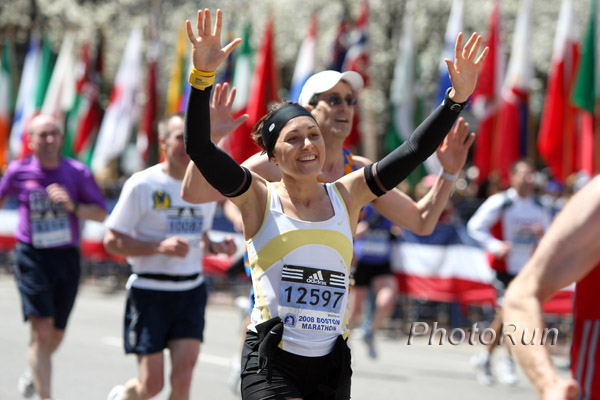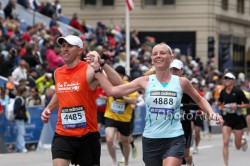Benefits of Exercise for Children
Get-up and Go!
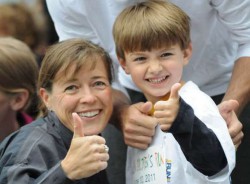
Among the many benefits are physical fitness, confidence and stronger self-esteem, more energy, better memory, and simply a good feeling about themselves—and they are easy to achieve. Our Take The Magic Step® team is as concerned as many of you about the growing problem of childhood obesity and the lack of exercise in their lives. Whether this obesity and inactivity is caused by the popularity of video games or the declining hours of physical education in schools, it is a wake-up call for everyone. Happily, there are ways of reversing this growing trend and helping our children to enjoy daily exercise and outdoor activities, which they love given the opportunity.
Our “Children’s Fitness and Health Program” is geared towards parents and educators, and focuses on creative ways to incorporate exercise into our children’s everyday routine. Outdoor games and playful workout routines can be the tools that instill lasting joy of exercise. I was so lucky that I was introduced to, enjoyed and benefited from these activities during my childhood. It created in me an appreciation and understanding of the complex benefits that fitness and exercise can add to a person’s wellbeing. Over the years I have been fortunate to share this lasting experience with many children and young adults. This Website is designed to address our families as well, so please click the YOU section on the toolbar above for more information.
To emphasize once again the importance of exercise, I have put together some of the health benefits an active child can expect.
Exercise Improves Physical Health
Long-term health benefits of exercise are:
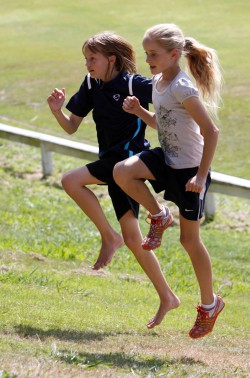 © Betty Shepherd
© Betty ShepherdA stronger immune system! The body’s ability to fight disease is improved. Children are less prone to colds, allergies, and diseases, including cancer.
- A reduction of type 2 diabetes by increasing insulin sensitivity and improving carbohydrate metabolism.
- A lower blood pressure and an improvement of the child’s cholesterol profile.
- A strengthening of the entire cardiovascular system, including the heart and lungs. The heart develops a higher “pump-activity” while the child’s heart and lungs are strengthened, supporting the prevention of heart disease.
- Children are less likely to become overweight and will have better control of their body fat. Overweight children are able to reduce their body weight and body fat due to the physiological effect of burning fat while exercising.
- Children develop stronger bone structure and muscle structure.
Active children enjoy additional health benefits, because:
- Exercise increases the blood flow to all body tissues, including the brain. Greater blood flow transports more oxygen and nutrients to the body’s cells.
- Active children improve their body’s ability to absorb oxygen through aerobic exercise. Due to the increased oxygen in their body’s cells they feel more energized. More oxygen translates into more energy!
- Increased blood flow promotes the body’s transportation of the byproducts of metabolism and toxins back from the cells for elimination, recycling, or further use elsewhere. Children who exercise feel fitter and more energized because of their body’s ability to detoxify.
- Active children breathe better and sweat more. Breathing and sweating are great ways to detoxify the body and help it keep itself “clean.”
- Children increase their over-all fitness through exercise(1).
Exercise Improves Mental Health
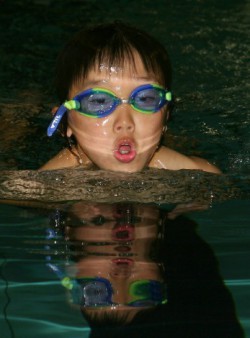
- Exercise enhances the brain’s metabolism. Studies show that active children have improved memory as a result of better brain function.
- Moderate, fun-oriented exercise literally burns off excess harmful hormones and, at the same time, increases the release of beneficial ones. One of the beneficial hormones acts as neurotransmitter for establishing new memories.
- Active children have the ability to concentrate much better, even at the end of a long school day.
- Studies report that exercise decreases anxiety, reduces depression, and improves mood and outlook in children. In addition, their quality of sleep is improved.
Perhaps most importantly, physical activity develops children’s self-esteem and confidence. Their ability to overcome challenging situations improves and they simply enjoy a better, sunnier outlook on life. In addition, our adolescent children can develop further social skills such as leadership and empathy.
To parents and educators: Your efforts to encourage our children to exercise more and instill in them the wisdom of good nutrition and a healthy lifestyle will yield years of dividends in these young people’s lives. (…and the benefits mentioned are for adults too.)
To YOU CHILDREN: I wish you enjoyment of all your outdoor activities, your exercise, and your school! We are always with you!

Reference:
(1) Gavin ML (Medical Editor, KidsHealth.org), Dowshen SA (Chief Medical Editor, KidsHealth.org), and Izenberg N (Editor-in-Chief and Founder, KidsHealth.org): Fit KIDS. 1st edition, DK Publishing, Inc., New York, NY 2004.
Reading Suggestions:
- A Head Start on a Lifetime of Wellbeing—Questions from Fit Teens Answered by Uta Pippig
- Remember, even champions once were beginners. Uta describes her early days in an awesome sport that has the advantage of keeping you fit without requiring much more than a pair of running shoes, some time, somewhere to run… and a little love for it. When I Started Running: Lasting Lessons, Chasing Dreams, and Fond Memories
Updated September 9, 2020
Updated June 1, 2016
Updated February 15, 2015
Updated March 3, 2013
Updated April 1, 2011
- Posted February 15, 2015
© Copyright 2006-2024 Uta Pippig. All Rights Reserved.
